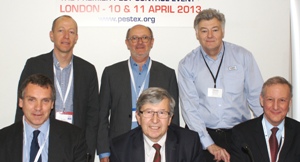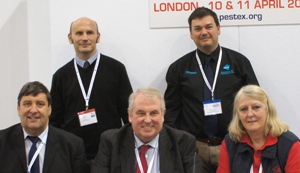|
European Standard for Pest Management Services

The panel: left to right:
Peter Whittall, Emmanuel Audon, Roland Higgins, Bertrand Montmoreau, Rob Fryatt and Chris Suter
This last session on the first day discusing the European Standard for Pest Management Services could easily have fallen into the ‘boring but important’ category. Fortunately, the format, where the moderator, Jacki Davis of Meade Davis Communications and a long-time correspondent of theDaily Mail based in Brussels, fired a series of rapid, hard-hitting, direct questions at the panel, turned this somewhat turgid topic into an entertaining and informative session.
Jacki had been well briefed on the concerns that pest controllers have about the proposed standard and her questions probed these topics as well as finding out exactly where the process is now and how much further there is to go before the standard emerges.
The panel comprised Rob Fryatt chair of the CEN TC404 technical workgroup which is drawing up the standard, Emmanuel Audon from Bureau Veritas, an international testing, inspection and certification services business, Bertrand Montmoreau, chair of CEPA, Dr Christopher Suter of the Royal Society for Public Health and Peter Whittall, group chief scientific officer, Rentokil-Initial and member of the CEN UK Mirror Group. None of them seemed to be sure when they would be asked to comment and on which question, which added to the liveliness of the session.
The key points to come out were:
- The draft standard is almost ready to go out on full consultation to the industry. It will leave the Technical Workgroup in May but then has to be translated into the various languages so it will be later in the summer when it is available for comment;
- Everyone in the industry (and outside) will have an opportunity to comment so please make an effort to read the draft when it is available and let the technical workgroup know your views. Keep an eye on the Pest website as we will keep you posted;
- The standard will come into force early in 2014;
- The standard is being written by the industry for the industry and puts us ahead of the game. Having our own standard will prevent something developed outside the industry being imposed at a future date;
- The standard will be voluntary. It will allow pest control businesses to demonstrate their professionalism. Commercially it is likely to become increasingly important in contracts and tenders. Those who do not engage with it are likely to lose out commercially in the long run;
- To have value we must make sure that only those who genuinely meet the standard are able to lay claim to it. Independent auditing will be essential;
- Big companies are likely to find it harder to comply with the standard than smaller operations simple because they have more technicians and will need more complex systems in place to ensure everyone is properly trained and meets the standard;
- Whilst there have been some areas of difference it has been amazing to see a huge level of commonalty among all 30 countries involved in the development of the standard;
- Local trade associations like BPCA will be providing help to pest control businesses so that they can meet the standard. Don’t be afraid of it, the standard has been designed for everyone and for every size of business. Most good pest controllers already meet most of the standard. It will only require small adjustments and perhaps a little more formalisation to reach it;
- The cost is unlikely to be high. Perhaps half a day for an audit. But beware in the run up to its introduction it is likely that a number of consultants will pop-up claiming that they will do everything for you. Until the standard is published no-one knows exactly what will be in it so don’t go spending money on consultants before you’ve seen the standard.
|
|
Pest Control: Possible Futures

The panel: left to right:
Steve Miller, Jacob, David Lodge, Jonathan Peck,
Stephen Jacob and Frances McKim
The ”Pest Control: Possible Futures’ session on the second day was chaired by Jonathan (Dimbleby) Peck with panellists David Lodge of Beaver Pest Control, Steve Miller, from the London Borough of Newham and also head of JLARS (Joint Local Authority Regulatory Service) which was responsible for ensuring that London Olympic Games were pest free, Stephen Jacob from BASIS PROMPT and our ownPesteditor, Frances McKim.
The questions were wide-ranging from the impact of the loss of products under the Biocidal Products Directive/Regulations to the pest control legacy of the London Olympic Games and a proposal to arm Boris Johnson to tackle urban foxes in London. Other topics covered included the image of pest control based on recent TV programmes, what BASIS PROMPT should be providing for members going forward, the out-sourcing of pest control services by local authorities and what trade associations should be offering and whether or not they are offering the right things now.
In response to the questions there was a good deal of consensus among the panellists and there were some excellent comments from the floor.
Here are some of the points made:
- The loss of products under BPD/BPR will make pest management more difficult but this is an opportunity for the good companies to demonstrate their professionalism and be recognised for it;
- We have to look after the pesticides we’ve got and use them responsibly;
- The loss of products is making some Local Authorities question whether or not they want to be doing this sort of work;
- The companies who are doing things properly need some commercial payback to cover the costs of membership of BPCA, CRUU, PROMPT etc;
- The next step for PROMPT now that it has its 2000th member signed up during PestEx is to look outwards to talk to customers to provide a service that allows the public to go online and check a pest controller’s PROMPT credentials just as they can under the Gas Safe scheme;
- Trade associations should introduce random checks on members to make sure they are operating at acceptable levels and have more teeth to throw out those that do not comply;
- Associations need to spend more time promoting pest control services to customers for example BPCA has done an excellent job with the Alexo magazine;
- As pest controllers we often see bad practice but we have no whistle blowing process in place. Perhaps the associations can take on this role;
- Never forget that TV is first and foremost entertainment. Be selective about what you get involved with but don’t shun TV exposure. It is a great way to promote the industry to the wider public and the old adage there’s no such thing as bad publicity does often hold true.
|



